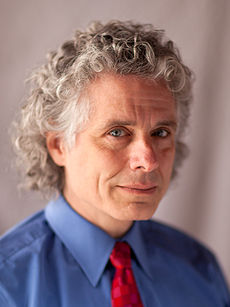Steven Pinker
Steven Arthur "Steve" Pinker (born September 18, 1954) is a Canadian-born American cognitive scientist, psychologist, linguist, and popular science author. He is Johnstone Family Professor in the Department of Psychology at Harvard University, and is known for his advocacy of evolutionary psychology and the computational theory of mind.
Pinker's academic specializations are visual cognition and psycholinguistics. His experimental subjects include mental imagery, shape recognition, visual attention, children's language development, regular and irregular phenomena in language, the neural bases of words and grammar, and the psychology of cooperation and communication, including euphemism, innuendo, emotional expression, and common knowledge. He has written two technical books that proposed a general theory of language acquisition and applied it to children's learning of verbs. In particular, his work with Alan Prince published in 1989 critiqued the connectionist model of how children acquire the past tense of English verbs, arguing instead that children use default rules such as adding "-ed" to make regular forms, sometimes in error, but are obliged to learn irregular forms one by one.
In his popular books, he has argued that the human faculty for language is an instinct, an innate behavior shaped by natural selection and adapted to our communication needs. He is the author of seven books for a general audience. Five of these, namely The Language Instinct (1994), How the Mind Works (1997), Words and Rules (2000), The Blank Slate (2002), and The Stuff of Thought (2007) describe aspects of the field of psycholinguistics and cognitive science, and include accounts of his own research. The sixth book, The Better Angels of Our Nature (2011), makes the case that violence in human societies has, in general, steadily declined with time, and identifies six major causes of this decline. His seventh book, The Sense of Style (2014), is intended as a general style guide that is informed by modern science and psychology, offering advice on how to produce more comprehensible and unambiguous writing in nonfiction contexts and explaining why so much of today's academic and popular writing is difficult for readers to understand.
...
Wikipedia

